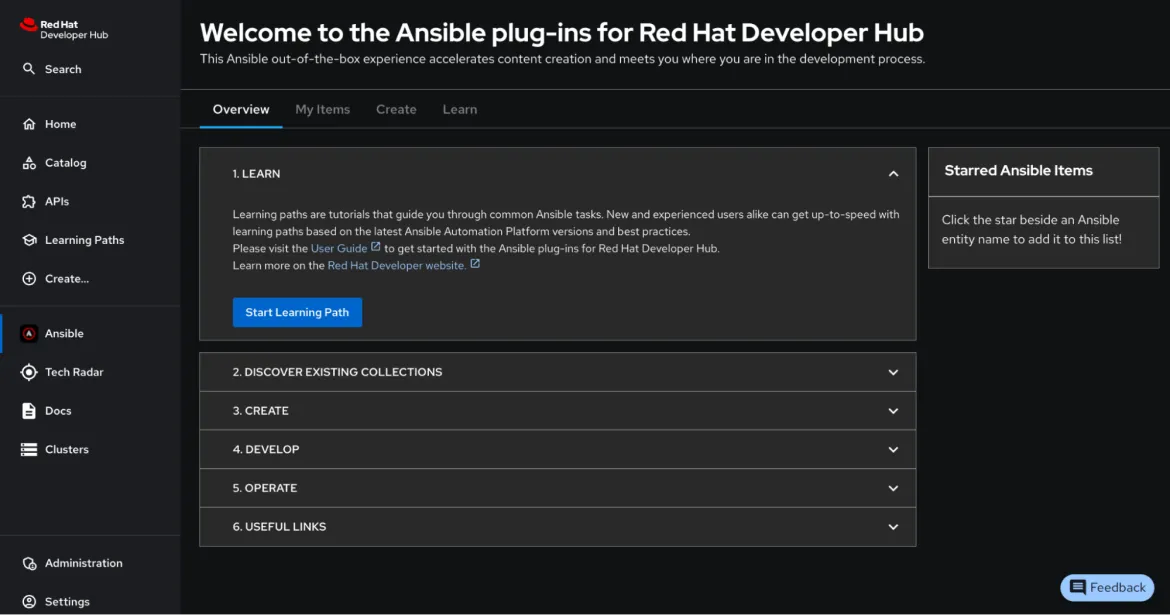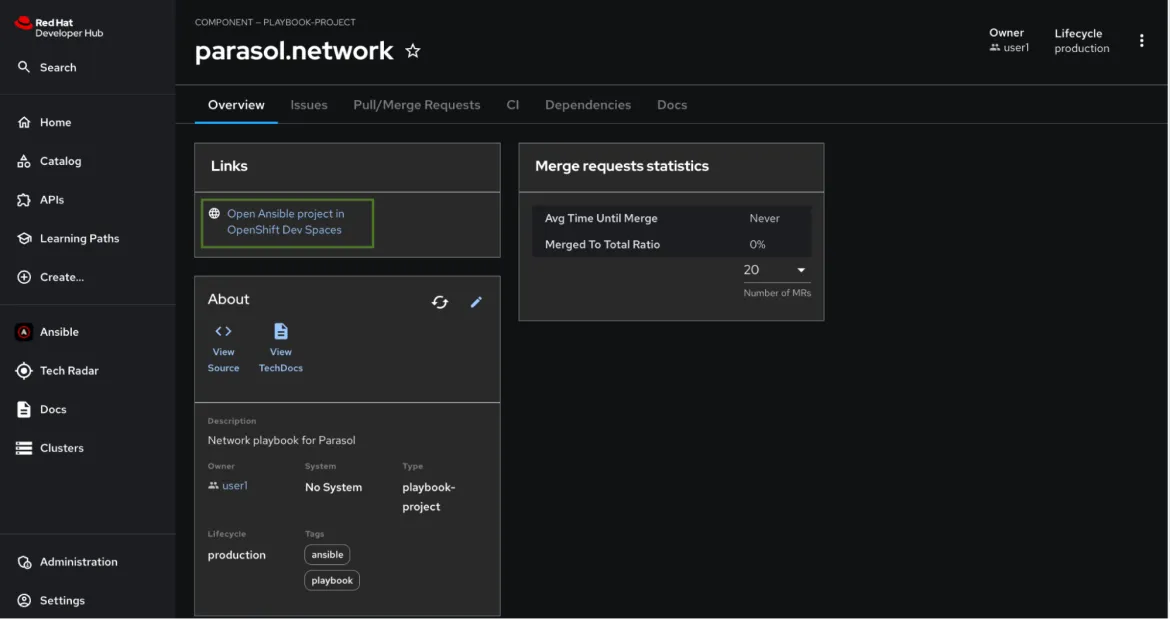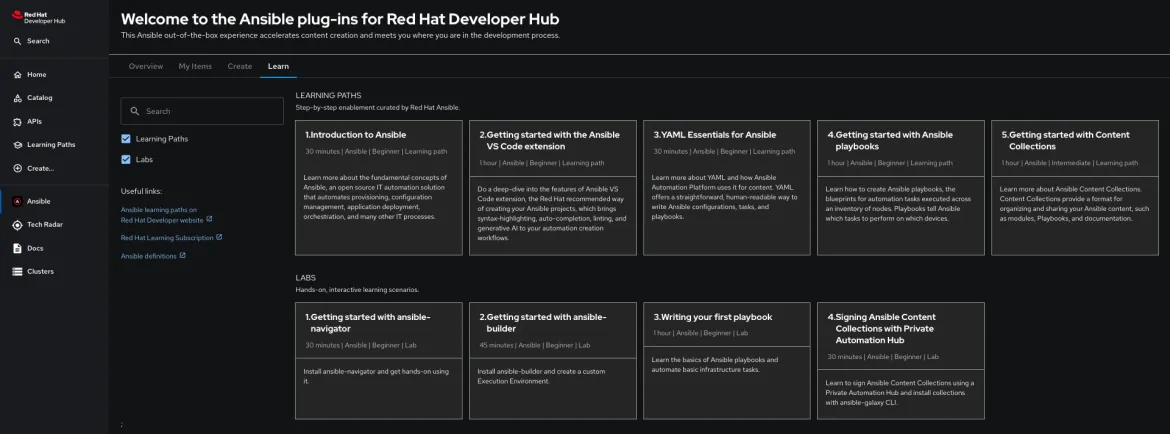In today’s fast-paced IT landscape, streamlining automation development workflows is paramount. The Red Hat Developer Hub offers an innovative framework for building internal developer portals (IDPs), providing a unified experience that reduces cognitive load and significantly boosts developer productivity.
Today we're announcing the technical preview of Ansible plug-ins for Red Hat Developer Hub, an integration of Ansible Automation Platform with Developer Hub. These plug-ins herald a new era for Ansible users by enabling a seamless, efficient and powerful automation platform experience for automation developers. This union provides a comprehensive platform that offers self-service workflows, guided enablement and standardized best practices, enabling a robust Community of Practice (COP) for automation in your organization.
Who benefits from Ansible plug-ins for Red Hat Developer Hub?
Automation Beginners
Getting started with Ansible can be challenging. You need to grasp various concepts such as YAML, source control, testing and integrated development environments (IDEs). The Ansible plug-ins for Red Hat Developer Hub help address these challenges by providing a centralized UI that collates a curated list of learning paths, push-button Ansible content creation and more to make onboarding smoother and more intuitive. You can quickly discover existing Ansible content and align with your organizational policies, thus accelerating your journey from novice to proficient.
Experienced automation developers
Automation specialists and domain experts, who often act on behalf of their organizations, will find immense value in this integration. They need their automation to be easily discoverable, distributable and consistently executable across the organization. Ansible plug-ins for Red Hat Developer Hub help reduce the need to switch between multiple tools, thereby saving time and enhancing the quality of the Ansible content created. This helps standardize and adhere automation to best practices, including CI/CD and testing, and promotes a consistent approach to automation across the enterprise.
Addressing core organizational challenges
Improving time-to-value
One of the principal challenges customers face with automation is realizing time-to-value as quickly as possible. Success with automation hinges on the effective creation of content such as playbooks, roles and collections, then standardizing and sharing this content across different teams. Ansible plug-ins for Red Hat Developer Hub delivers a platform engineering approach to creating, managing and scaling quality Ansible content beyond an individual user to the entire IT organization.
Streamlining disparate tooling
Creating Ansible content often involves using various tools such as integrated development environments (IDEs) and Git, each with its own interface. The fragmented nature of these tools requires constant context switching, which can slow down development. Ansible plug-ins for Red Hat Developer Hub offer a centralized interface, bringing all necessary tools together. This assists in streamlining the development process and enables documentation that is consistent and easily accessible, reducing the time automation developers spend searching for information.
Enhancing discoverability and reusability
Organizations often have a wealth of Ansible content that is purpose-built and tested for reuse. With this in mind, Developer Hub provides a centralized catalog that tracks ownership and metadata, making it easier for developers to find and reuse existing automation resources. This promotes the standardization of automation content and discourages the use of untested, one-off automation scripts.
Key Features
Customized Ansible interface
The Developer Hub integration features a customized welcome page that offers an Ansible-first UI experience. This provides users with a dedicated space to access Ansible content, tutorials and best practices. The interface is tailored to meet the specific needs of Ansible users, making it easier for them to find and use the tools they need for automation.

Landing page of Ansible plug-ins for RHDH
Seamless content creation
The solution includes Developer Hub software templates that facilitate a push-button experience for creating repositories to host Ansible Playbooks, roles and collections. These templates follow our recommended best practices, including testing, linting and support for Ansible execution environments. Users can generate new Ansible Git projects with an intuitive step-by-step UI workflow, and edit it directly with a Red Hat OpenShift Dev Spaces instance preconfigured with the Ansible development tools. (Note: OpenShift Dev Spaces is a separate, optional product and is not required to use the Ansible plug-ins for Red Hat Developer Hub.)

Embedded software templates for push-button Ansible creation experience.

Linked directly to Ansible devs spaces.
Integrated pipelines
Pre-configured pipelines, deployed as part of the template repositories, help make your Ansible content consistent. Integrating ansible-lint, these pipelines automatically run upon any push to the repository, so that content adheres to best practices.
Integrations with Ansible Automation Platform
The platform provides links to private automation hub and automation controller, making certified, ready-to-use content more visible to help users get started quickly and run their automation.
Comprehensive learning paths
Developer Hub offers expanded learning paths to guide users in customizing best practices and policies for automation. A dedicated section for Ansible documentation, learning paths, labs and knowledge base articles provides a one-stop shop for all Ansible-related help content.

Ansible-specific learning paths and labs
How to get started
To get started using the technical preview of Ansible plug-ins for Red Hat Developer Hub:
- Already an Ansible Automation Platform and Red Hat Developer Hub subscriber? Download the plug-in.
- Not currently subscribed? Learn how to try it in the Developer Sandbox.
Sobre o autor
Anshul is a Principal Marketing Manager at Red Hat, where he brings his software development and QE experience to increase Ansible Automation Platform's adoption experience for customers by producing technical content on all aspects of the product.
Mais como este
Navegue por canal
Automação
Últimas novidades em automação de TI para empresas de tecnologia, equipes e ambientes
Inteligência artificial
Descubra as atualizações nas plataformas que proporcionam aos clientes executar suas cargas de trabalho de IA em qualquer ambiente
Nuvem híbrida aberta
Veja como construímos um futuro mais flexível com a nuvem híbrida
Segurança
Veja as últimas novidades sobre como reduzimos riscos em ambientes e tecnologias
Edge computing
Saiba quais são as atualizações nas plataformas que simplificam as operações na borda
Infraestrutura
Saiba o que há de mais recente na plataforma Linux empresarial líder mundial
Aplicações
Conheça nossas soluções desenvolvidas para ajudar você a superar os desafios mais complexos de aplicações
Programas originais
Veja as histórias divertidas de criadores e líderes em tecnologia empresarial
Produtos
- Red Hat Enterprise Linux
- Red Hat OpenShift
- Red Hat Ansible Automation Platform
- Red Hat Cloud Services
- Veja todos os produtos
Ferramentas
- Treinamento e certificação
- Minha conta
- Suporte ao cliente
- Recursos para desenvolvedores
- Encontre um parceiro
- Red Hat Ecosystem Catalog
- Calculadora de valor Red Hat
- Documentação
Experimente, compre, venda
Comunicação
- Contate o setor de vendas
- Fale com o Atendimento ao Cliente
- Contate o setor de treinamento
- Redes sociais
Sobre a Red Hat
A Red Hat é a líder mundial em soluções empresariais open source como Linux, nuvem, containers e Kubernetes. Fornecemos soluções robustas que facilitam o trabalho em diversas plataformas e ambientes, do datacenter principal até a borda da rede.
Selecione um idioma
Red Hat legal and privacy links
- Sobre a Red Hat
- Oportunidades de emprego
- Eventos
- Escritórios
- Fale com a Red Hat
- Blog da Red Hat
- Diversidade, equidade e inclusão
- Cool Stuff Store
- Red Hat Summit

